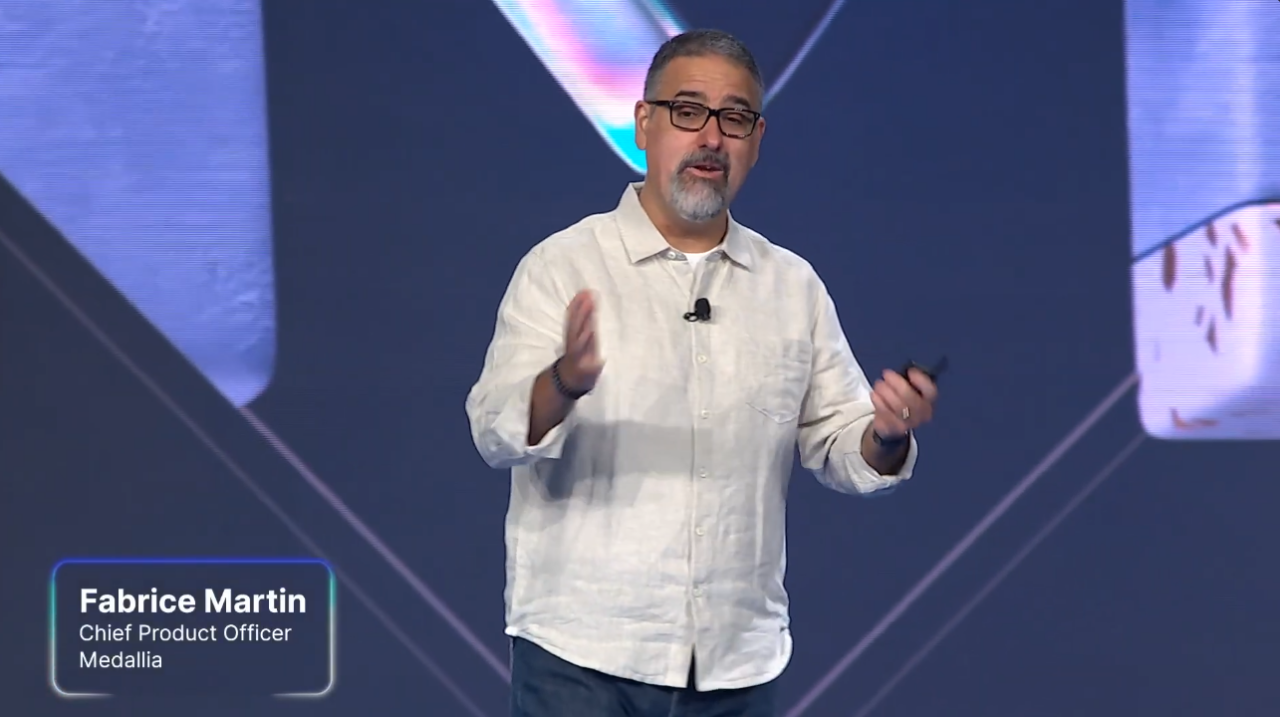October 22, 2025
CXM Talks to Medallia’s CPO, Fabrice Martin, About the 2026 Evolution of Customer Experience

Effervescent Fabrice Martin recently joined Medallia as Chief Product Officer and CXM figured it would be a good time to sit down and find out how his adventure was going. In a time of rapid business change and market evolution, from AI to empathy, advisory boards to customer stories, he spills les haricots on what’s coming to the CX market soon.
You’ve been at Medallia for 9 months, how’s it going and what attracted you to the company?
So it’s going very well. It’s been an incredible nine months at Medallia. What brought me here is the team that I’m working with.
Most of the executive leadership team here at Medallia is new (Mark Bishof took over as CEO at the start of the year). And these are people that I have worked for and with for more than a decade in the customer experience and employee experience space.
I really enjoy working with them and love our space and this industry. So it has been an amazing experience so far.
What has impressed you most or been the highlight so far?
In terms of what I have enjoyed the most, the thing that is top of mind is getting to know our customers. I just came back this weekend from our customer advisory board session. We meet twice a year, at least, sometimes even more, but we had an incredible meeting in Austin related to the Grand Prix which was also a lot of fun.
These are the best and most well-run companies in the world. These are incredibly knowledgeable people, and leaders in their companies. They’re all passionate about customer experience. And the fact that they have chosen to partner with us and that we get the opportunity to sit together and have these incredible conversations is amazing.
And I feel very lucky and humbled to be able to interact and partner with those experts.
Medallia wants to be the nervous system for CX, can you explain more?
(Fabrice was recently talking about the nervous system in Las Vegas)
I think that our role here at Medallia is to become that nervous system, in terms of being the connectivity between every single signal that comes into one of our customers. Those signals can be feedback surveys, they can be calls into their contact centre, digital sessions on their mobile application or their website.
These are all signals that we will capture. And, for the past decade plus, we have been developing incredible AI algorithms and technology that is able to connect those dots at massive scales and then start making sense of those signals – establishing what is happening, why it is happening, and what I should do about it?
And then that same nervous system will read those signals and use them to ultimately take action. Just as the brain takes signals from the body to move something, drink water, take the next step. Medallia can take those signals and use them to tell those frontline employees, those contact centre leads, those insights teams within a customer experience organisation, what the right next step should be, right, and what they should do.
Yet, as you know, where there’s positive signals, there’s going to be negative signals. But those are useful too. Because they are all good learnings for the future and for the organisation that allows them to provide better experiences to both customers and employees.
Do you have any insights or concerns about the recent AWS outage?
Yeah, absolutely. But in the couple of decades we’ve been in the business we have developed redundancy, best practices, the ability to reroute traffic across the different cloud vendors.
We do host some of our data centres ourselves. So the good news is that while situations like this can affect us, like it will have affected many businesses around the world, we have the right people, technology and processes that allow us to minimise the impact that a situation like this can have on our operations and our customers’ operations. Our customers rely on us every single day.
In fact, a few weeks ago, we were meeting with one of our hospitality customers a few weeks back. It was early morning, already more than 19,000 employees had already logged into Medallia to check their score, their actions, and feedback from customers. This is something that completely blows me away.
So that’s the level of concurrency and operation that we operate and our customers expect from us day in and day out. Tens of thousands of users in a single company logging into our systems.
AI is driving product evolution, but as it gets smarter, do you think we see AI creating its own product features?
We spend a lot of time making sure that AI does what it is expected to do and ensure that we harness the power of the LLMs that we use in the best way.
But as we know, the AI systems will hallucinate, they will do some things that are unexpected. We don’t want that, right? So, back to the example customer I spoke about earlier, when you have tens of thousands of users in a single business logging in and expecting value out of these algorithms, we need to make sure that they do not hallucinate, that they are secure, that they deliver value day in and day out.
Over the last few months we’ve been rolling out new Gen AI functionality, and what has been really positive are the results that our customers are seeing.
To give you a few examples:
- One of the features that we released is called Themes. It looks at millions of data points and bubbles up what people are talking about. Within 24 hours of one of our US retail customers turning it on, they had already an incredible insight and discovered something unexpected. Through the conversations with and feedback they discovered that their customers were being charged with an invisible surcharge, specifically on cat food. That was causing confusion and generating frustration. The client dug further into the issue, and revealed an operational bug in the system. They caught the issue within 24 hours, thanks to the theme detection functionality, and they were able to fix it.
- Another feature that we put out in the past few months and that has been widely adopted is Intelligent Summaries. One of the things that these large language models are really good at is summarising a tonne of data. And so one of the features that we put out allows contact centre leads or contact centre agents to very quickly, through a summary, understand what has happened, and what the trajectory of a customer has been. So, instead of, for example, listening to a 10-minute call or reading a long transcript of a conversation, in 10 seconds they can read the summary and be up to speed with everything that has been going on with that customer.
- One last one which I think is pretty cool because it ties to personalised and empathetic responses, is another feature we introduced called Smart Response. One of the key things, as we have all learned from experience management, is that you need to close the loop with customers. If they give you feedback, they expect to hear back from you. So, we developed Smart Response which, after an interaction or feedback from a customer, suggests what the best response to that customer is. Based on that customer’s profile, their transaction history with the company, and the branding of the company itself, it will come up with a perfectly drafted response that can be adapted as needed.
- When we first rolled out this feature, 93% of the responses were did not need modification. Clients just hit send. So it has enabled the businesses that have adopted it to close the loop more consistently, on brand, and more empathetically with their own customers. And more importantly, give back more time that they can spend with customers or driving their business.
Do you think AI is getting closer to delivering empathy at some level?
I think we’re getting closer, but we’re not there yet. There are huge developments in Agentic technology, and we’re starting to test them with customers the idea of having a chunk of the experience driven by a chatbot. There are so many use cases where this would work well, say for example, if you need to make a reservation for a flight next week or you ask for recommendations for the best laptop for a family member who’s off to university etc.
Going forward, more and more of those interactions are going to be handled by bots based on knowledge bases, understanding of the customer and personalization. And, a really important part of the success of this experience will be ensuring the delivery by an empathetic, very on-brand bot. Then, that opens the door for bots helping you with a doctor’s appointment, your purchase needs, flight reservations, shop orders, across all aspects of experience. This will be transformational.
I think that technology is getting there. Again, we are delving deep into these types of innovations and you’ll see some very interesting and exciting announcements from Medallia on that front in the next few months.
What are you most looking forward to at Medallia in 2026?
It is very important for us to rethink our business and rethink the value that we’re bringing to our customers as these technologies completely transform and sometimes disrupt the nature of our space. So, we’re not afraid to reinvent and go in new directions if that’s where we feel the industry is going.
One of the things that I’ve been talking about with our customers and my counterparts in the industry is the concept of being frontline-ready. When we talk about generative AI, most of us think of ChatGPT. That’s not the type of tool that our customers are ready to roll out to 50,000 users in the front lines. Because it hallucinates, it requires prompting expertise.
It would actually be quite risky to roll out that type of tool to a store manager or to a contact centre team lead. So what we have focused at Medallia for these past few months is how can we bring this incredible, powerful technology to the front lines. How do we essentially make it secure, predictable, and consistent? So that’s what we call frontline-ready AI.
Tell us more about frontline-ready?
It’s introducing this type of technology in a very simple manner, making it predictable, reliable, scalable, and secure, and designing it for non-technical, non-analyst users. It’s right there in their day-to-day workflows, like smart response. They don’t need to do anything, but suddenly, Gen AI is helping them do their jobs better.
So that’s a concept that I’m really proud of because I don’t see other companies in our space focused on the front lines as much as we are. And if you’re going to roll out a new feature, you don’t want one person to use it, you want 1 million using your feature. That’s where you create value and leverage. And the front lines, for me, is exactly where you can do that. If one of our customers has 20,000 users in the system, and by turning it on, suddenly we bring additional value to 20,000 people, that feels pretty cool.
Thanks to Fabrice for him time, and we’re not at all jealous he was in Austin for the Grand Prix! To hear more from Medallia, take a look at CXM’s visit to Saudi Arabia for EXP KSA where we talked to Mike Debnar about experience management.




